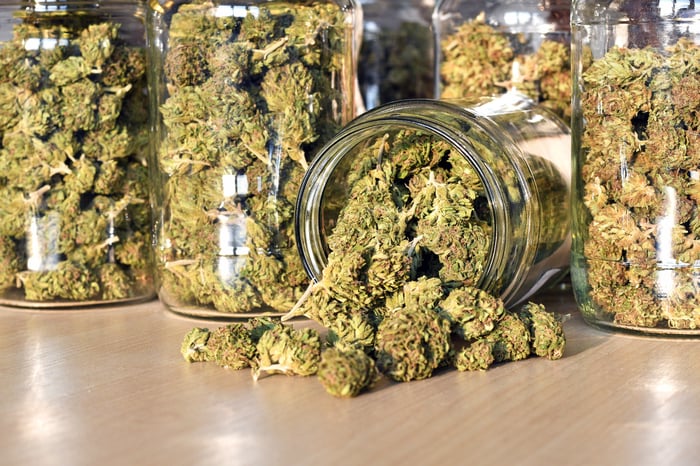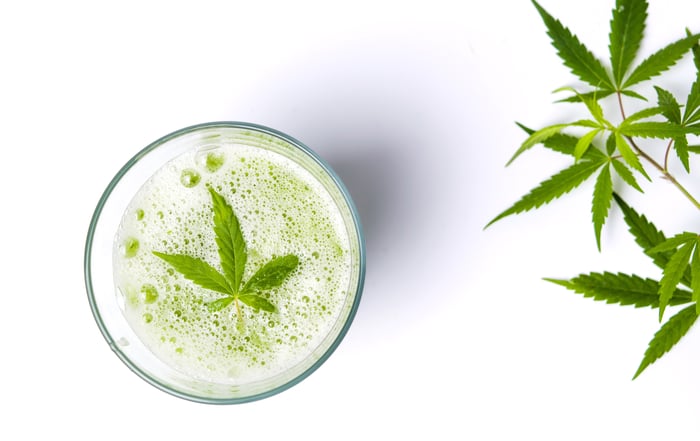After a pretty awful May, marijuana stocks as a whole had a much better June, with the Horizons Marijuana Life Sciences ETF crawling higher by 2%. There's potentially $75 billion in annual sales on the line by 2030, and investors don't want to miss out on their chance for once-in-a-generation-type growth.
But as investors, we also know that not every company in a fast-paced industry can be a winner. Some have downright worrisome business models or income statements, while others seem to have overstepped their bounds in terms of valuation. As we march on with 2019, consider the following three pot stocks as "off-limits" for July.

Image source: Getty Images.
Innovative Industrial Properties
Say what? Avoid what's arguably the most profitable marijuana stock in the entire industry? Indeed, that's what I'm suggesting -- at least for the month of July.
Cannabis real estate investment trust (REIT) Innovative Industrial Properties (IIPR 1.50%) has been virtually unstoppable since the year began. Shares of the company have soared 166% through July 2. Investors are excited about the company's two consecutive quarters of dividend hikes, as well as the doubling of the number of properties it owns over the past six months from 11 to 22.
Generally speaking, since this is a cannabis REIT that buys grow farms and processing sites, it'll have relatively fixed costs. Therefore, the more properties acquired, the more net operating income (NOI) it'll pocket. And the more NOI it generates, the bigger that dividend will grow. This is why IIP, as the company is also known, has grown its payout by 140% from the year-ago quarter.
While continuing to pile on the properties looks like a surefire way to larger profits and a juicier dividend, there's one pretty sizable catch: REITs are constrained by their cash on hand. Since most of Innovative Industrial's earnings get returned to shareholders in the form of a dividend, IIP leans on common stock issuances to raise cash. This is a pretty normal practice for REITs, and not just cannabis-focused REITs like IIP.
But as we know, issuing shares to raise cash can have a near-term negative impact on investors by diluting the value of their existing shares. IIP's share price has risen 47% last month alone and the company has been aggressively acquiring new properties through the first six months of the year; therefore, the possibility of a cash raise via common stock offering is very high, in my opinion.
If you already own shares of Innovative Industrial Properties, I wouldn't suggest doing much of anything right now, as the long-term business strategy remains firmly intact. But if you're on the outside looking in, my suggestion would be to wait for a more attractive entry point.

Image source: Getty Images.
Tilray
Another strong June performer that should be avoided in July is Canadian grower Tilray (TLRY).
Shares of the popular pot stock rallied close to 23% last month, with the bulk of the gains coming on news that it would acquire private equity firm Privateer Holdings via a downstream merger. Privateer is Tilray's largest shareholder, holding 77% of the company's outstanding common stock. Investors can stop worrying about if and when Privateer will start unloading its position because the acquisition will allow Tilray to distribute these shares in an orderly way over a two-year period. Therefore, no more concerns of an insider exodus.
While I agree this is good news, it overlooks many of the major problems with Tilray -- namely, that its business model is meandering at the moment and its gross margin has been absolutely anemic.
Although CEO Brendan Kennedy has announced plans to focus future investments on Europe and the United States, it's an odd move to make with Canada just ramping up its adult-use market. This announcement, in my view, feels like Tilray was simply outmaneuvered in its domestic market and must now look outside of Canada to save face and justify its premium valuation.
The bigger issue is that gross margin has come in at just 20% and 23% in the two most recent quarters. Tilray has been forced to purchase cannabis on the wholesale market due to a lack of in-house supply, which is crippling its margins. In fact, just this past Tuesday, Tilray agreed to buy 30 million Canadian dollars ($22.9 million) worth of dried marijuana from Zenabis Global at wholesale prices.
As long as Tilray is leaning on wholesale agreements, it remains a pot stock worth avoiding.

Image source: Getty Images.
New Age Beverages
Last year was a game changer for New Age Beverages (NBEV). Already sporting an existing line of dietary supplements and ready-to-drink beverages, New Age announced in September that it'd be developing and launching a line of cannabidiol (CBD)-infused beverages. (CBD is the popular nonpsychoactive cannabinoid best known for its perceived medical benefits.)
Then in December, New Age announced a cash-and-stock deal worth $85 million to combine with Morinda. Because Morinda has a larger product portfolio and, more importantly, a distribution network in more than 60 countries around the world, this deal looked like a no-brainer for New Age.
However, New Age Beverage's stock has done little for investors in 2019, and there's reason to believe further downside may be expected. The first issue has to do with increased competition in CBD-infused beverages. Although CBD is a hot commodity right now, there's little in the way of customer loyalty and brand recognition. In fact, soon enough you'll be able to buy CBD at your local gas-station convenience store. Investors are likely underestimating the amount of competition that New Age's CBD-beverage line will face in the upcoming quarters.
Further, despite the fact that year-over-year first-quarter sales more than quintupled, the new-look New Age Beverages is still losing a significant amount of money on an operating basis and its organic growth rate has been relatively flat for numerous quarters. Sure, a line of new CBD beverages could boost its top line and get New Age closer to profitability, but the company's existing line of beverages have gone flat.
My suggestion: Leave this cannabis stock on the shelf, which is where it belongs.





